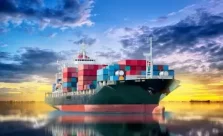Reading time 3-4 min.
Navigating the Seas with Marine Trackers
In today’s interconnected world, the ability to track ships in real-time has become crucial for various stakeholders in the maritime industry. Ship tracking, also known as vessel tracking or marine tracking, provides valuable insights into the location, status, and movements of cargo ships. This article dives into the world of ship tracking and explores the benefits of live ship trackers for enhancing maritime operations.
Understanding Ship Tracking
Ship tracking involves the use of advanced technology, such as Automatic Identification System (AIS) and Global Positioning System (GPS), to monitor the positions of vessels in real-time. These tracking systems collect and transmit data that can be accessed through dedicated platforms or applications.
Real-Time Visibility
Live ship trackers offer real-time visibility of vessel positions, enabling shipping companies, port authorities, and logistics providers to monitor the movement of cargo ships. This information is valuable for efficient voyage planning, route optimization, and ensuring timely deliveries.
Safety and Security
Ship tracking plays a vital role in enhancing maritime safety and security. By knowing the exact location of vessels, potential collisions, piracy threats, and accidents can be identified and mitigated promptly. Search and rescue operations can also be conducted more effectively with the help of ship tracking data.
Fleet Management
For shipping companies, ship tracking systems provide valuable data for fleet management. By monitoring the performance, speed, and fuel consumption of vessels, operators can optimize operational efficiency, reduce costs, and maintain compliance with environmental regulations.
Port Operations
Port authorities utilize ship tracking to streamline their operations. Real-time tracking data enables efficient allocation of berths, scheduling of arrivals and departures, and managing the overall port traffic. It enhances port security by detecting any unauthorized entry or suspicious activities.
Cargo Monitoring
For cargo owners and logistics providers, ship tracking offers visibility into the movement of goods throughout the supply chain. It allows them to track the progress of shipments, estimate arrival times, and proactively manage any delays or disruptions.
Environmental Monitoring
Ship tracking systems also contribute to environmental monitoring efforts. By tracking vessel emissions and compliance with emission control areas, authorities can enforce environmental regulations and reduce the ecological impact of maritime activities.
Conclusion
Ship tracking, powered by live ship trackers, has revolutionized the way the maritime industry operates. With real-time visibility into vessel positions, this technology enhances safety, security, and operational efficiency. It empowers shipping companies, port authorities, cargo owners, and logistics providers to make informed decisions and navigate the seas with confidence. Embracing ship tracking is essential in today’s dynamic maritime landscape to drive sustainable growth and ensure smooth global trade.
all about Ship
the editorial team




Leave a Reply